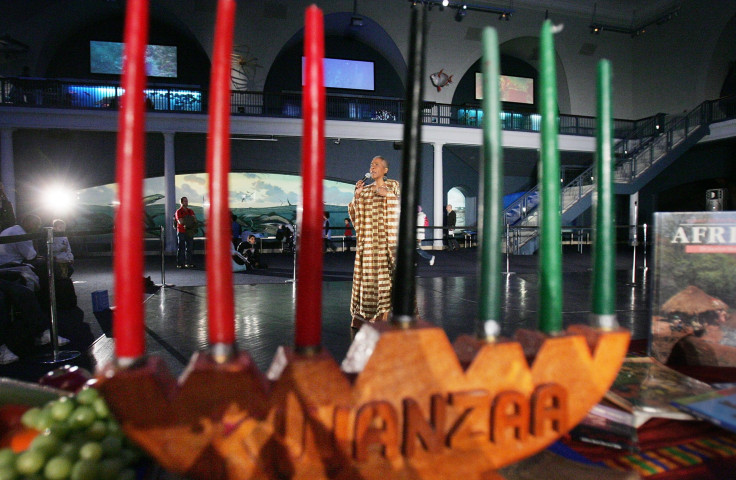Kwanzaa 2017: What And When Is The African-American Holiday?

Kwanzaa is a week-long African-American celebration that was created more than 50 years ago. This year, Kwanzaa begins Dec. 26 and ends Jan. 1, 2018.
The holiday is based on seven principles as a way to "reaffirm the communitarian vision and values of African culture and to contribute to its restoration among African peoples in the Diaspora, beginning with Africans in America and expanding to include the world African community," the official Kwanzaa website states.
The seven principles on which Kwanzaa is based are as follows: For Day 1, Umoja, which means unity; Day 2, Kujichagulia, which means self-determination; Day 3, Ujima, which means working together; Day 4, Ujamaa, which means supporting each other; Day 5, Nia, which means purpose; Day 6, Kuumba, which means creativity; Day 7, Imani, which means faith, especially faith in oneself.
The word "Kwanzaa" comes from the phrase, "matunda ya kwanza" which means "first-fruits." Its name comes from the first harvest celebrations held in ancient Egypt and Nubia. Kwanzaa is not a religious holiday but a cultural celebration.
Explaining why Kwanzaa is celebrated for seven days, the official website writes: "In terms of authenticity, Kwanzaa is modeled on first-fruits celebrations in ancient Africa, especially on Southern African first-fruits celebrations like Umkhosi of Zululand which has seven days. The central reason for Kwanzaa's being seven days is to stress the Nguzo Saba and through this introduce and reaffirm communitarian values and practices which strengthen and celebrate family, community, and culture."
Those celebrating Kwanzaa participate in a similar ritual to Hanukkah by lighting seven candles -- one for each day of the week-long celebration -- on a candle holder, called a Kinara. It is also celebrated by exchanging gifts, eating food from various African countries and greeting each other with "Habari gani," which is Swahili for "How are you?/ How's the news with you?"
The Kwanzaa celebration comprises of seven symbols that are placed around the home to represent African cultural values. These are:
1. Mkeka — a woven placemat
2. Kinara — a candleholder with places for seven candles
3. Mishumaa saba — seven candles (three red symbolizing struggle, three green symbolizing the future, and one black candle symbolizing the African people) that are placed in the kinara to represent the Nguzo Saba.
4. Kikombe cha umoja — a unity cup that is used to pour libation, or a drink typically poured as an offering to a spirit or god or in memory of a loved one who has died
5. Vibunzi — an ear of corn representing each child in the family
6. Mazao — a bowl of fruits and vegetables to represent the harvest
7. Zawadi — gifts to children, typically a book and a heritage symbol
© Copyright IBTimes 2024. All rights reserved.











